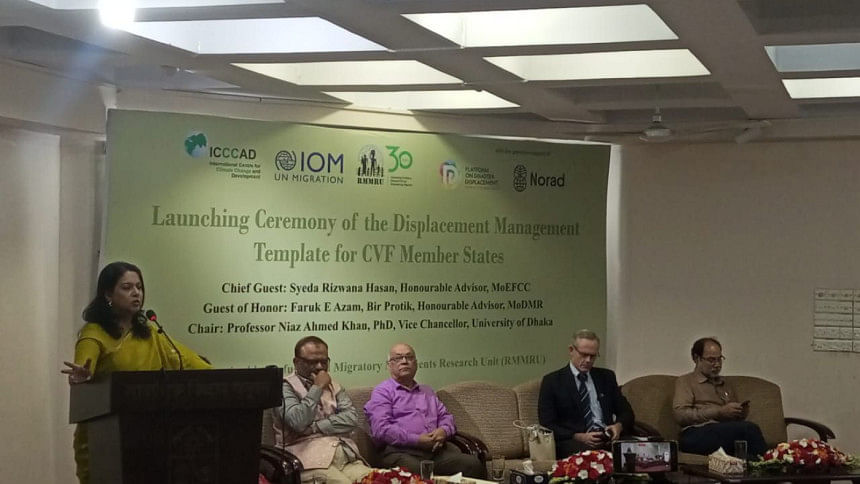RMMRU unveils displacement framework for climate vulnerable countries

The Refugee and Migratory Movements Research Unit (RMMRU) has unveiled a model policy framework to help countries—especially those in the Climate Vulnerable Forum (CVF)—manage people displaced by climate change and disasters within their own borders.
The framework, inspired by Bangladesh's own national strategy, will be formally proposed at the upcoming COP30 summit in Belém, Brazil, for adoption by other CVF members.
It was launched at an event held today at the Mozaffar Ahmed Chowdhury Auditorium of the Faculty of Social Sciences at Dhaka University.
Speakers at the event included Environment Adviser Syeda Rizwana Hasan, Disaster Management Adviser Faruk E Azam, RMMRU acting executive director Prof Tasneem Siddiqui, Lance Bonneau of the International Organization for Migration, and Faculty Dean Taiabur Rahman, among others.
The model offers a comprehensive, three-phase approach: Prevention, Protection during Displacement, and Durable Solutions.
The "prevention phase" focusses on reducing people's vulnerability before displacement occurs. This involves improving early warning systems, identifying displacement hotspots, and promoting livelihood resilience strategies such as disaster-resistant crops and accessible vocational training.
The "protection phase" aims to uphold the rights and dignity of individuals during displacement. It prioritises the provision of emergency relief, the establishment of legal frameworks to safeguard displaced populations, and ensuring access to employment opportunities.
The "durable solutions phase" focusses on securing long-term outcomes through voluntary return, local integration, or planned relocation. It highlights the importance of ensuring tenure security, preserving cultural identity, and fostering coordinated partnerships with international organisations and the private sector.
"This is not only Bangladesh's issue—displacement affects all 69 CVF countries," said Environment Adviser Rizwana Hasan addressing the event.
"Indeed, ensuring adaptation for displaced populations is the single greatest challenge of climate change," she added.
Prof Tasneem Siddiqui noted that 17 million Bangladeshis were displaced between 2014 and 2022, including 2.4 million in 2024 alone.
She highlighted international recognition of Bangladesh's strategy, with endorsements by ADB and IDMC as a best practice in 2024.
"The framework allows other countries to build on Bangladesh's lessons while shaping context-specific responses," she said.
Adviser Faruk E Azam said, "Bangladesh's national strategy on internal displacement management will guide various government departments in securing the rights of displaced people."
As the lead representative, Lance Bonneau said, "IOM will play a role in international and Bangladeshi displacement management."
Vice-Chancellor Prof Niaz Ahmed Khan, who chaired the event, commended the University of Dhaka for its role in developing a "globally relevant" research framework and pledged continued institutional support.

 For all latest news, follow The Daily Star's Google News channel.
For all latest news, follow The Daily Star's Google News channel. 



Comments